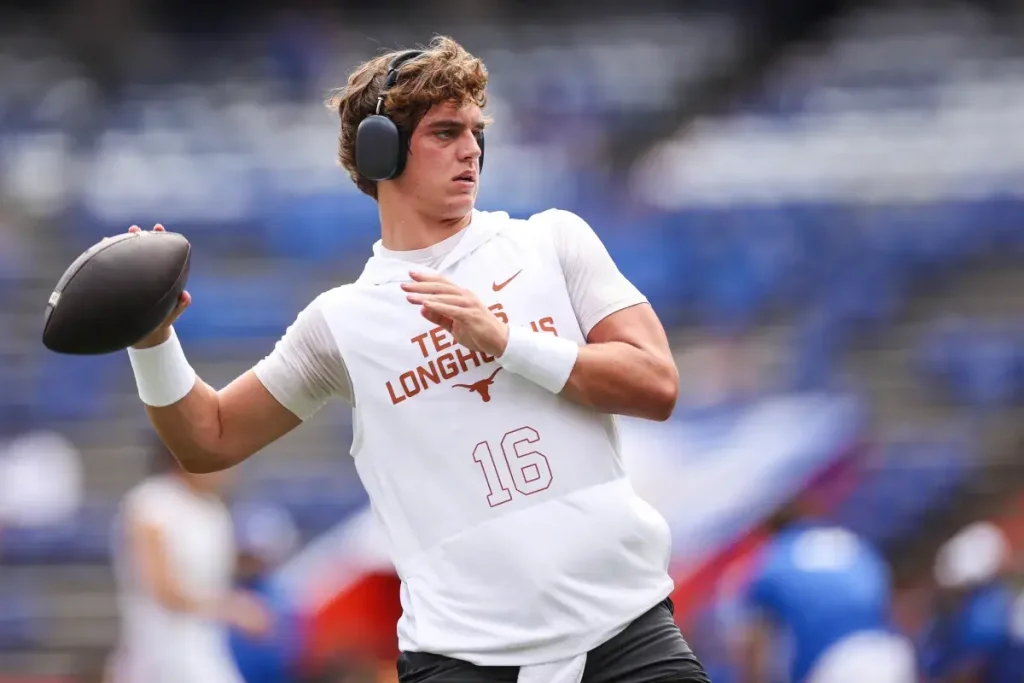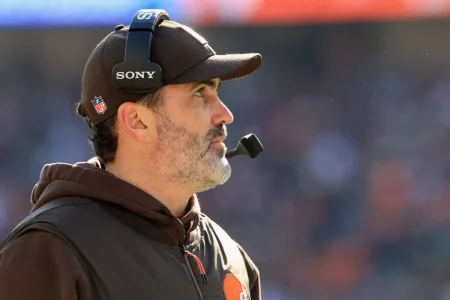Arch Manning’s Struggles Highlight Texas Longhorns’ Early Season Woes
The University of Texas Longhorns, who began the season with the coveted No. 1 ranking and championship aspirations, now find themselves in a troubling 3-2 position after a disappointing 29-21 loss to SEC rival Florida. At the center of this unexpected struggle stands redshirt sophomore quarterback Arch Manning, whose performance has drawn intense scrutiny from fans, analysts, and former players alike. The final moments of the Florida game highlighted the team’s challenges, with Manning taking a critical sack and then making a questionable decision to spike the ball with no time remaining on the clock. This sequence capped off a game where Manning went 16-for-29 for 263 yards with two touchdowns but also threw two costly interceptions. For a program with Texas’s storied history and championship expectations, these moments have triggered significant concern about whether the young quarterback can lead the team through its challenging SEC schedule.
The criticism directed at Manning has been swift and unrelenting across social media platforms. Many fans have explicitly called for his benching, suggesting that senior backup Matthew Caldwell might provide more stability at the position. One particularly pointed comment on social media noted, “Texas has zero chance to win meaningful football games with Arch Manning right now. He should be benched.” Others questioned whether Manning’s famous surname has protected him from being replaced despite his inconsistent play. Even former NFL quarterback Kurt Benkert weighed in on the discussion, expressing disbelief at Manning’s game-ending clock management error. The widespread criticism represents a startling shift for a quarterback who arrived in Austin with immense hype as part of the legendary Manning football dynasty, with expectations that he would eventually lead Texas back to national prominence.
What makes this situation particularly concerning for Texas is the dramatic fall from their preseason standing. Starting the year as the consensus top-ranked team in college football, the Longhorns first stumbled in a low-scoring 14-7 loss at Ohio State, which many viewed as a respectable defeat against another elite program. However, Saturday’s loss to Florida has raised more serious questions about the team’s ability to compete at the highest level in their new conference. Texas entered the Florida game ranked ninth nationally but will likely fall substantially in the next rankings. Perhaps most troubling for the Longhorns and their sophomore quarterback is what lies ahead: a matchup with fifth-ranked Oklahoma in the storied Red River Rivalry, a game that now takes on even greater significance for Texas’s season trajectory and Manning’s development.
The on-field struggles that Manning has exhibited extend beyond simple statistics. Observers have noted apparent confusion in pre-snap reads, hesitation in decision-making, and inconsistent mechanics under pressure. While some defenders point to offensive line protection issues as contributing factors, others contend that a quarterback with Manning’s pedigree and physical tools should be able to elevate the performance of those around him. The final drive against Florida encapsulated these concerns, with Manning appearing unsettled and making the critical time management error that eliminated any chance of a comeback. This pattern of mental mistakes has prompted many to suggest that, despite his talent and lineage, Manning might benefit from more development time before carrying the weight of the Texas offense.
Context matters when evaluating Manning’s performance and the team’s position. Texas’s move to the SEC this season represented a significant step up in competition, and growing pains were expected for even the most talented roster. Head coach Steve Sarkisian faces the difficult challenge of balancing long-term development with immediate expectations for a program that hasn’t won a national championship since 2005. The quarterback’s struggles mirror the team’s overall adjustment to their new conference environment, where the margin for error is considerably smaller than what they experienced in the Big 12. Additionally, the immense pressure and scrutiny that comes with the Manning name creates a unique psychological burden that few collegiate athletes ever experience, potentially affecting the young quarterback’s confidence and composure in critical moments.
As Texas prepares for Oklahoma and the remainder of their schedule, Sarkisian and his staff face critical decisions about their quarterback situation and offensive approach. While many are calling for Manning’s benching, others suggest that patience and continued development might be the wiser long-term strategy. The coming weeks will reveal much about the resilience of both Manning and the program as a whole. Can the young quarterback use this adversity as a catalyst for growth, or will continued struggles force a change under center? For a Texas program that entered the season with championship aspirations, the path forward now involves recalibrating expectations while still pursuing improvement. The Manning era at Texas was supposed to signal the program’s return to national prominence, but five games into his tenure as starter, both quarterback and team find themselves at a crossroads far earlier than anyone anticipated.















